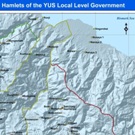Income generation: $150 a month in vegetables sales
I have several friends here in Guatemala with whom I actively trade seeds, seedlings, and excess produce from our vegetable gardens. Slowly, over time we’ve learned which varieties function well in our high altitude (1840M/6040ft) tropical climate. We have all worked on growing basic food for our families—and also for increasing valuable vitamins and micronutrients in our diets. Plus, we grow things that aren’t always available in Guatemala for cooking traditional recipes from our home countries.
Money and Food. In all of our online courses two of the main challenges that course participants come across are food insecurity, and a lack of income. We frequently propose to students that they investigate developing income from excess garden production; it is a very realistic way to generate extra income while at the same time fulfilling family food needs.
We mention that the first thing that needs to be done is to identify a market link—and to identify fruits and vegetables that markets need on a routine basis and for which they have a shortage. The types of markets that I’m speaking about could be:
- door to door sales in your local community
- a local open-air village market
- a vegetable wholesaler from a big city
- a vegetable store/grocery store
- a hotel or restaurant in a neighboring city
| Market Links |
Developing a sales relationship. |
 |
The next step is to set up a sales relationship with the identified market. If appropriate, ask your new sales contact if they can help you with training and initial inputs of things like seeds. Frequently they are happy to do this because they need the additional produce—and they want to make sure that it’s grown to the correct quality.
|
My friend Ricardo in Guatemala City has a beautiful vegetable garden—but it’s only the size of a typical backyard. However, he produces more than he and his wife can eat.
He recently made some smart decisions about his excess produce. He first investigated what vegetables are in demand that he is good at growing. He thought about going to some restaurants in Guatemala City but focused instead on a store that specializes in selling vegetables to affluent Guatemalans, to ex-pats and to government/NGO workers from Europe and North America. He felt this was a good idea because he realized that the store’s customers might want fruits and vegetables that are hard to find in Guatemala—but that he was already good at growing.
So he made some initial queries at the store and then showed up one day with samples of his produce—which they immediately purchased—and then asked him to bring more. These initial sales of his samples allowed him to evaluate and negotiate pricing.
| Crops |
In the first couple of months they have focused on purchasing from Ricardo:
|
 |
All things that Europeans and North Americans miss from home and would like to routinely cook with.
|
Excess garden produce = income generation. In his first three months he’s averaged $150 a month in sales. Even $100 a month for many rural families could create a change in their overall prosperity.
His individual his sales aren’t large—a few cents for his limes for example—but these individual sales accumulate over the course of a month.
| Marketing/Sales Plan |
Ricardo did some really smart things:
|
Ricardo created a customer.
|
Now that they have seen several months of production from Ricardo—and seen the quality of his produce—they are suggesting new things that he might be able to grow for them (like parsnips).
Ricardo is now hoping to increase sales to $200 a month!
Would you like to learn about gardening for nutrition?
Read more about the solutions which students have developed to address community challenges.
Questions? Online.Learning@csd-i.org
Be sure to visit CSDi’s Development Community. Join 800 colleagues in sharing resources & collaborating online.
Learn more about design and implementing Community Based Development Projects.












